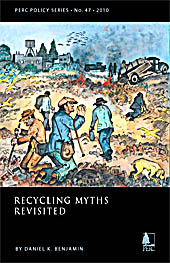
Montana State University, like many others across the nation, has a goal to increase recycling. The stated goal is to cut waste by 25 percent by 2020. I am not sure where the 25 percent figure came from. It is a nice figure, divisible by five, sounds good.
The purpose is to reduce waste by recycling more because it saves money and is good for the environment. And, we are told, it reduces our carbon footprint. The argument is that recycling more means less garbage is sent to the landfill, so less money is spent in tipping fees. But the costs expended to do that extra recycling are not fully accounted for. The university may “save” money by sending less to the local landfill, but money is spent collecting and delivering the recyclables. A lot of that is done by individuals using their own time and resources to get the material to a common location. That energy and effort expended is hard to tabulate, so providing a fair analysis can be difficult.
Those recyclables then need to be delivered to the manufacturing plant where they are actually transformed. That can be a long way. That transportation takes energy, and more energy is used to remanufacture them. The additional transportation and remanufacturing have their own environmental impact.
Finally, by reducing the waste in the landfill there is less methane produced which can reduce greenhouse gas emissions. Many new landfills actually collect methane, however, and use it to power homes and industry nearby. The local landfill here does not have that capability. But all that additional transport of recyclables and the remanufacturing increases carbon emissions. Whether those emissions are better or worse than the methane that would otherwise be emitted from the landfill has not been determined.

For more, see Dan Benjamin’s study on the myths of recycling.
Originally posted at Environmental Trends.



